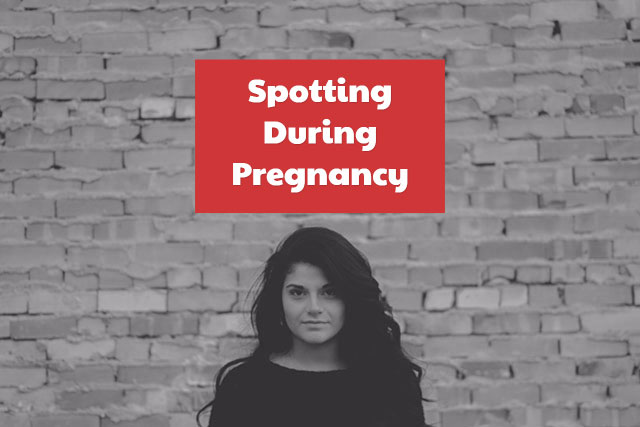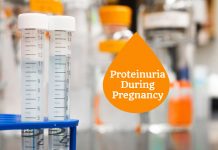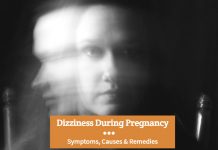A pregnant woman lives with a lot of anxiety. Many fears are clouding her mind all the time. Seeing blood on her undergarments can give her a panic attack. Bleeding during pregnancy is a sign of miscarriage. Spotting during pregnancy is not equivalent to bleeding.
Most women fail to understand the difference between bleeding and spotting during pregnancy.
The main difference lies in the amount of blood.
Spotting is light staining and bleeding is like a flow. Pinkish or brown discharge is spotting.
Bleeding is generally bright red because it is fresh.

Spotting during early pregnancy
About 1 in every five pregnant woman experiences spotting during early pregnancy. Light spotting during pregnancy first trimester is due to normal reasons.
Your uterus is adjusting to the new kind of hormones. The cervix becomes extremely sensitive, and a slight running can cause spotting.
Brown spotting during pregnancy may be any old blood coming out of the vagina. After you are pregnant, your period undergoes temporary cessation.
The old blood from the previous period can now come out as brown spotting.
Spotting during pregnancy first trimester is normal and needs no worrying. Contrary to this is bleeding in the first or second trimester.
Paediatric and Perinatal Epidemiology Journal 1 published a survey on various factors such as maternal age, weight, race, and lifestyle that could be reasons for spotting during pregnancy.
The conclusion was a correlation between a number of previously done abortions with the occurrence of vaginal bleeding. Whether induced or spontaneous they negatively affect maternal health by increasing spotting while pregnancy.
Age factor and smoking also heighten the risk of bleeding in pregnant women.
Spotting during the first month of pregnancy may be implantation bleeding.
Implantation is the process of attachment of the embryo to the uterus. When the embryo grows, it needs nourishment, and so it implants to the uterine lining causing bleeding called implantation bleeding.
Reasons for Spotting during Pregnancy first trimester
It is normal for about 20% woman to experience spotting during the first trimester. Spotting during pregnancy occurs at first and last trimester.
Spotting is not harmful as it is mostly old blood or just a few drops.
The European Society of Human Reproduction and Embryology ESHRE journal published an article about ‘First-trimester bleeding and pregnancy outcome in singletons after assisted reproduction‘ 2
Often after getting a fertility treatment women to conceive twins or multiples. Vanishing twin syndrome is the condition where the mother’s body absorbs tissues of one baby. The other baby continues as a singleton pregnancy. In such a case there is bleeding in the first trimester.
Further, it increases the risk of preterm birth, second and third trimester bleeding. Spotting after ART is a common occurrence. For heavy bleeding, after IUI or embryo transfer you need to call a doctor.
The reasons for spotting during the first trimester are implantation and other processes.
1) Implantation bleeding
The most common cause of spotting during pregnancy is implantation. It is the process of attachment of baby’s cells to the uterus. It is necessary for deriving nutrition for growth.
When implantation occurs, you may experience cramps and spotting. They are signs of implantation.
2) Hormone fluctuations
During early pregnancy, a lot of hormonal up and down occurs. Various hormones keep falling and shooting their levels. It is the main reason for mood swings and morning sickness.
The hormonal orchestra can even lead to spotting during the first trimester.
3) Pap smear
The vagina and cervix are extremely sensitive during pregnancy. Any examination of those regions requires the use of tools.
Tools go inside the vaginal passage. This irritates the lining and causes bleeding.
But the bleeding doesn’t last for long. It is what women may see as spotting during pregnancy.
You may feel itching and burning for a while along with spotting. But it will soon subside.
4) Cervical changes
The cervical region undergoes many changes. There is a growth of the uterus. All this leads to angiogenesis.
Angiogenesis is the formation of new blood vessels. It can cause spotting and cramping during pregnancy.
The old blood may come off the vagina as the fluids fill the uterus.
5) Uterus growth
The uterus grows from the size of a fist to that which holds a baby. It crushes the nearby tissues. This doesn’t mean that it will injure them. But during the process spotting during early pregnancy occurs.
6) Sexual intercourse
Sex during pregnancy is very different from normal sex. It doesn’t pertain to the sexual act but the after effects.
Some sex positions may not be comfortable any longer.
Spotting after sex during pregnancy is a sign that you need to avoid doing it that way.
7) Sexually transmitted diseases
Spotting due to inflammation of the vagina during pregnancy is hazardous. When you are pregnant, you must practice safe sex.
Safe sex is advisable otherwise too. If you have multiple sex partners during pregnancy, then you are at risk of spotting due to STD.
Using a condom avoids such mishaps.
8) Miscarriage
Even though this point will give your knots in your stomach, we need to mention.
Spotting during pregnancy could also be a sign of impending miscarriage. A chemical pregnancy occurs within the first few weeks of pregnancy. Spotting is one of its sign.
There is nothing to worry about. Most women have miscarriages in their lifetime.
Some don’t even come to know that they were pregnant and thought that it was period.
9) Ectopic pregnancy
A tubal pregnancy is when the embryo implantation isn’t successful. Ectopic pregnancy is extrauterine pregnancy.
The embryo doesn’t travel down to the uterus. It instead implants in the fallopian tubes.
Excruciating cramps and spotting during pregnancy follow this.
Ectopic pregnancy is difficult to diagnose at an early stage. It needs medical attention.
10) Molar pregnancy
A molar pregnancy occurs when the sperm fertilizes an empty egg.
The tissue that was going to become a baby grows into an abnormal mass.
Molar pregnancy has spotting as one of its symptoms. Despite not having a baby Molar pregnancy still shows signs of pregnancy.
11) Subchorionic bleeding
There is a space between layer outside and the placenta. Blood can collect here.
This later comes off as spotting or subchorionic bleeding. There is nothing to worry as it stops by itself.
It doesn’t continue for long. You may need a panty liner for some time.
12) Breakout bleeding
Breakout bleeding is normal bleeding at the time of expected period.
Women might experience this spotting for the first three months of pregnancy.
Others may continue to experience it throughout their pregnancy.
It is normal, and these women go on to have a healthy pregnancy and babies.
13) Medications
Some medications may also cause spotting during pregnancy. Antidepressants are essential for females having depression during pregnancy.
Leaving antidepressants course can cause a relapse of depression. So they will have to continue with the dug despite seeing spotting during pregnancy.
Spotting during Pregnancy last trimester
Spotting during the third trimester is as common as that during the first trimester. Obstetrics & Gynecology The Green Journal which is the official publication of the American College of Obstetricians and Gynecologists 3, in one of the studies concluded bleeding to be linked to familial preterm birth.
The study was conducted for a small group of 211 women out of which 130 had a history of familial preterm birth. Nearly half of the women who had preterm birth witnessed bleeding during pregnancy.
This is because as the time of delivery nears the membranes will start rupturing.
There are a few significant reasons for spotting during pregnancy third trimester.
1) Placenta Previa
It is the condition of the low lying placenta over the birth canal. The placenta is not well supported. It sags down and covers the birth canal.
The blood vessels may compress under pressure. It causes spotting during the last trimester.
2) Uterine abruption
If a woman is pregnant for the second time, then she can undergo uterine abruption.
Uterine abruption is the testing of uterus tissue. C-section scar from previous surgery can tear off. This is why it is best to undergo natural labor and delivery and avoid future complications.
Any surgery can leave scars and cause spotting later on.
3) Vasa Previa
Blood vessels of the baby placenta or umbilical cord come through birth canal opening. It can jeopardize the baby’s life.
The blood vessels coming out can undergo breakout bleeding. If that happens then, baby’s vessels open and oxygen supply cuts off.
Reduced oxygen supply reduces the ability of the baby to move.
4) Placenta abruption
Placenta removes from the uterus and blood accumulates between the placenta and uterus.
If the placenta detaches from the uterus, then there can be bleeding.
If the tearing is not major, then the bleeding may stop. It causes spotting during pregnancy.
However, if due to any reason the placenta completely detaches from the uterus then it can lead to extreme complications.
You must inform your doctor if you have pain along with spotting during pregnancy.
5) Premature labor at 37 Weeks
There are many reasons for preterm labor. Even after 37 weeks, it is still premature labor.
Pregnant water leaking should not occur at this time. If you see spotting during this phase of pregnancy immediately inform your doctor.
With proper precautions, preterm birth can be saved from death.
Intensive care unit for neonates has many such provisions to provide the best care for prematurely delivered babies.
6) Losing your mucus plug
When your pregnant water leaking begins, you lose your mucus plug.
This is the signal that you can go into labor at any moment. It is the time when women shift to hospital.
Traveling to the hospital, later on, is life-threatening.
Is Spotting During Pregnancy Normal?
Spotting during pregnancy is healthy if it is in moderate amounts.
Heavy bleeding during pregnancy is not healthy.
You can consult with your doctor if you experience other problems like itching and cramping.
Your doctor may advise you the necessary steps to prevent spotting during pregnancy.
Is it normal to spot during pregnancy? Yes, it is prevalent. Even after knowing this it does scare women. It is solely because of the few negative reasons for spotting during pregnancy.
How much Spotting is normal during pregnancy?
Spotting during pregnancy is normal if it doesn’t soak a pad. If you wear a liner and it gets soaked, then it is not normal.
Similarly spotting at different times of the day during pregnancy is normal. If you continue to bleed unstoppably, then something is wrong.
Spotting during pregnancy without any other symptoms is normal.
It is best to consult a doctor if you feel that something is wrong.
Spotting during last trimester needs medical attention because at that time it may be a hint of premature labor.
When to call the doctor for spotting during pregnancy?
The Australian and New Zealand Journal of Obstetrics and Gynecology ANZJOG 4 laid emphasis on the diagnosis of bleeding during pregnancy using cervical examinations. Placental complications such as placenta accreta lead to internal hemorrhage.
Smear tests are important when you have discharge or pink spotting in pregnancy. Warts caused by Human PapillomaVirus can clog the vagina and cause bleeding.
The report showed a near miracle case where a 23-year-old, despite having a 4 cm cauliflower-like growth in her cervix had elective C-section after 38 weeks. Despite having bleeding and an anogenital tumor she continued her normal pregnancy.
Bleeding in pregnancy caused by condyloma acuminatum of the cervix is a severe complication. Warts and Human Papilloma Virus infection occur in around 29% of pregnant women.
Seldom will serum levels of hPL or PAPP-A hint subchorionic hemorrhage. Similarly, doctors may skip cervical examination for diagnosing early pregnancy bleeding.
You can get elective cervical smear test for checking the cause of vaginal bleeding in the first trimester.
What to do when spotting during pregnancy?
If you are spotting during pregnancy, then it may be a sign that you need some more rest.
Here are ways to stop spotting during pregnancy:
- Sleep with many soft pillows under your feet.
- Spend more time seated
- Have a healthy diet
- Take bed rest
- Avoid lifting heavy weights
- Consult your doctor about any sports you play
- Stay hydrated to avoid shedding and cracking of blood vessels
Spotting during pregnancy is not something to worry about. Most women who have spotting go on to deliver healthy babies.
Spotting First Trimester Sign Of Miscarriage
A group of 4510 women was assessed for studying the relationship between first-trimester bleeding and miscarriage. Only 27% of them had spotting or bleeding during their pregnancy and half of them had miscarriages.
The study, Association between first-trimester vaginal bleeding and miscarriage 5 concluded that spotting for 1-2 days during pregnancy does not significantly affect the risk of miscarriage.
Heavy bleeding along with pain are the symptoms of threatened miscarriage.
Footnotes
- Predictors of vaginal bleeding during the first two trimesters of pregnancy, Juan Yang David A. Savitz Nancy Dole Katherine, https://doi.org/10.1111/j.1365-3016.2005.00655.x
- Petra De Sutter, Julie Bontinck, Valerie Schutysers, Josiane Van der Elst, Jan Gerris, Marc Dhont; First-trimester bleeding and pregnancy outcome in singletons after assisted reproduction, Human Reproduction, Volume 21, Issue 7, 1 July 2006, Pages 1907–1911, https://doi.org/10.1093/humrep/del054
- https://journals.lww.com/greenjournal/Abstract/2016/05001/Bleeding_During_Pregnancy_is_Associated_With.244.aspx
- Australian And New Zealand Journal of Obstetrics and Gynecology ANZJOG https://obgyn.onlinelibrary.wiley.com/doi/abs/10.1111/j.1479-828X.2012.01472.x
- https://www.ncbi.nlm.nih.gov/pmc/articles/PMC2828396/#!po=82.2917










Hi there, thanks for the great article. I have a question I’m hoping you
might be able to answer. I was wondering, What is the difference between anxiety disorder and paranoia.
I have bad fits of paranoia sometimes and I’m thinking I might look into anxiety medication. I would appreciate any insight you can provide.
Hello. Paranoia is a psychotic disorder where you have thoughts of being conspired against. It leads to anxiety and is a form of anxiety disorder in an exagerrated form. Anxiety disorder is more general that the person worries about any and everything. There may be a root cause of anxiety like pregnancy. But paranoia is very specific category relating to feeling under threat or danger. Prescribing medicines or suggesting them is beyond scope of helping our readers.
Hi there, My name is Agnes Please does spotting smell’s bad?
Hi Agnes, You can get answers to your questions from experts here: https://trk.justanswer.com/SHPU